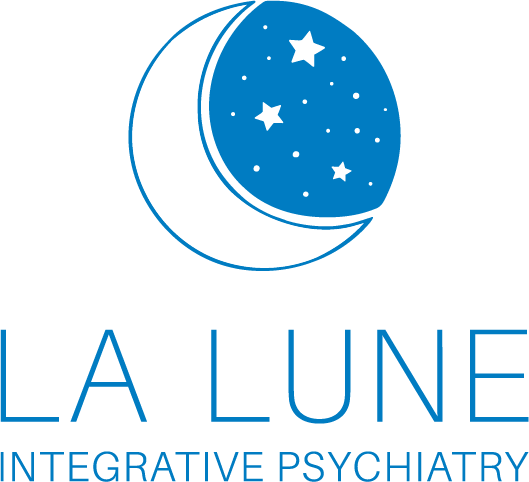SSRIs: More Than Antidepressants — How Personalized Psychiatry Makes the Difference
When people hear “SSRI,” they often think antidepressant.
But that label tells only part of the story.
Illustration of neuron-to-neuron communication across a synapse, where neurotransmitters like serotonin carry signals between cells.
Selective Serotonin Reuptake Inhibitors (SSRIs) are actually a class of medications that help regulate mood, different types of anxiety, and emotional balance — and their use extends far beyond depression. For many patients, SSRIs are prescribed for anxiety disorders, panic attacks, PTSD, OCD, and premenstrual mood changes that greatly impact quality of life.
At La Lune Integrative Psychiatry, we take a whole-person approach to understanding how and when these medications can help — and when other factors may be contributing to what you’re feeling.
SSRIs 101: How They Actually Work
SSRIs increase the availability of serotonin, a neurotransmitter that influences mood, sleep, energy, and emotional regulation.
For some people, this serotonin availability is lower or less efficient, whether due to genetics, stress, hormonal changes, or long-term environmental factors. SSRIs help restore balance by allowing existing serotonin to remain active longer in the brain, improving the way mood and emotion are regulated.
In simple terms:
SSRIs can possibly help the brain’s communication system “flow” more smoothly, reducing emotional overactivation and anxiety.
They shouldn’t numb emotions or change your personality — you should speak to your provider if you feel that way to determine the core cause. If indicated, they should restore balance where stress or biology has caused disruption.
These medications are slow and steady. It typically takes 4–6 weeks to reach full therapeutic effect, and dosing is customized and gradual, based on your unique biochemistry and response. Your provider will usually follow-up more often in the beginning to make sure you are going at an appropriate pace towards an optimal dose.
SSRIs Are Not “One-Size-Fits-All” — Here’s Why
There are several SSRIs, each with slightly different properties and FDA approvals:
| Medication | Common Brands | FDA Approved Uses |
|---|---|---|
| Sertraline | Zoloft® | Depression, anxiety, panic disorder, PTSD, OCD, PMDD, SAD |
| Escitalopram | Lexapro® | Depression, generalized anxiety disorder |
| Fluoxetine | Prozac® | Depression, OCD, bulimia, panic disorder, PMDD |
| Paroxetine | Paxil® | Anxiety, depression, social anxiety disorder, PTSD, panic disorder, OCD, PMDD (CR) |
| Citalopram | Celexa® | Depression, anxiety (off-label) |
Choosing the right medication or SSRI isn’t guesswork — it’s evidence-based decision making. Each one has a unique side effect profile, so if you have a side effect with one, it doesn’t necessarily mean it will occur with another. We consider:
Your family and personal mental and physical health history
Your lab work (like thyroid, vitamin D, hormones, and metabolic markers)
Your genetic profile (some people have variants that affect medication metabolism and response)
Your current environment and stress factors
Your psychological patterns and coping skills
Your past medication history and that of your biological family members (if known)
This comprehensive assessment helps us find the lowest effective dose with minimal side effects, and ensures the medication supports—not replaces—your natural ability to heal and adapt.
Beyond Serotonin: The Three Forces That Shape How We Feel
Mental health isn’t just about brain chemistry. Three main areas interact to affect how we experience stress and mood:
Environment: Childhood experiences, trauma, or ongoing stress (like burnout or toxic relationships) can sensitize the nervous system.
Biochemistry: Hormonal shifts, seasonal changes, inflammation, and nutrient imbalances all impact serotonin and cortisol levels.
Genetics: Our DNA can influence how we respond to stress and whether we metabolize medications quickly or slowly.
Because of these variables, a full psychiatric evaluation—not just a quick prescription—is essential. When we understand the whole picture, we can prescribe the smallest effective dose, support lifestyle changes, and teach distress tolerance skills for long-term stability.
Side Effects: Understanding and Managing Them
Most people tolerate SSRIs well, and any side effects that appear are usually temporary or dose-dependent.
Possible short-term effects include:
Mild nausea or headache
Sleep or appetite changes
Temporary emotional “flattening” as the brain adjusts
We always aim for the lowest therapeutic dose—the point where the medication helps without unwanted effects. If side effects occur, we can reduce the dose, change timing, or adjust to another medication that fits better with your biology.
Importantly, SSRIs have been studied for decades in large, long-term clinical trials and are considered in most circumstances safe, effective, and non-addictive. We always look at each situation individually and weigh risks and benefits of all treatments. We do a comprehensive medical history to make sure there are no contraindications.
Benefits of Reducing the Frequency and Severity of Depressed Mood and Anxiety
When well-matched and properly managed, SSRIs and other medications can help with more than mood. By finding the right regimen with your provider and reducing anxiety or depression, medications can:
Reduce cortisol, your body’s main stress hormone
Lower blood pressure and physical tension
Regulate sleep patterns
Improve emotional resilience with the improved ability to practice coping strategies and symptom reduction
This makes them valuable tools not only for symptom relief, but also for helping patients engage more fully in therapy, relationships, and lifestyle changes.
Personalized Psychiatric Care, Wherever You Are
Our licensed psychiatric nurse practitioners provide holistic, telepsychiatric care in Washington, Oregon, Colorado, Arizona, and New Hampshire helping patients find the right balance of medication, therapy, and self-care to restore long-term wellness.
Please be aware that SSRIs are just one class of medication that can help with anxiety and depression. Because of their favorable side effect profile and proven effectiveness for certain conditions, it’s possible we might start with this class of medication. However, for certain conditions with anxiety and depression as symptoms (such as bipolar spectrum, borderline personality, complex trauma), or history of intolerance to this class of medication, sometimes a different treatment plan may be considered.
If you’ve wondered whether an SSRI could help you — or if you’ve tried one before without success and want a second opinion — a comprehensive evaluation can make all the difference.
Ready to understand what’s really behind your symptoms?
Book your appointment today to explore personalized, holistic psychiatric care in WA, OR, CO, AZ, and NH.
Disclaimer: This website does not provide medical advice and may be out of date. The information, including but not limited to text, PDFs, graphics, images, and other material contained on this website are for general educational purposes only. No material on this site is intended to be a substitute for professional medical advice, diagnosis, or treatment, and does not create a patient-doctor relationship. Always seek the advice of your qualified healthcare provider with any questions you may have regarding a medical condition, lifestyle or dietary changes, treatments, and before undertaking a new health care regimen. Never disregard professional medical advice or delay in seeking it because of something you have read on this website.





